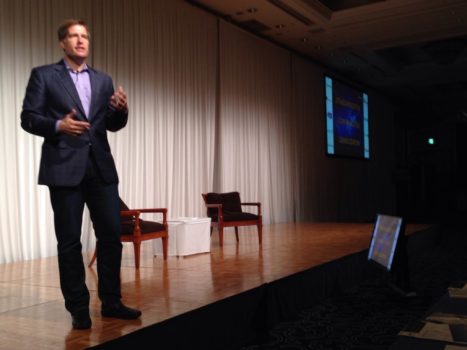AppNexus CEO Tells ATS Tokyo: ‘Differentiate Or Die’
by on 16th Sep 2014 in News

Speaking at ATS Tokyo this morning (16 September), Brian O’Kelley, AppNexus, CEO, told attendees the ad tech sector was ripe for both commoditisation and consolidation, as companies like Google attempted to “own” the sector. Elsewhere, attendees where advised on the application of data, and warned of the upcoming “data wars”.
Keynote speaker O’Kelley advised the ad tech sector to focus on innovation, or else face decimation from cash-rich companies looking to “own ad tech”.
During his address, O’Kelley said his earlier ambitious projections for the growth of the ad tech sector had underestimated the eventual uptake of programmatic advertising.
But while this heady was growth is good news in theory, it now posed companies in the sector with increased competition, especially as a growing number of businesses – from handset OS providers and telecoms operators – attempt to forge a key stakehold in ad tech.
“As this explosive growth continues we’ll reach a phase when the market standardises,” he said.
O’Kelley further forecast that in 2015, more and more ad tech standards will have to emerge as the technology reaches saturation, resulting in ad tech becoming a commodity.
Some people may say this is a “bad word”, but O’Kelley said he thought it was a “good thing”. This is “unless you’re in a ‘commodity ad tech business’ [only],” he added.
Consolidation
In turn the ad tech industry will start to consolidate (in more ways than one), according to O’Kelley, especially as companies such as Google, as well as those from the enterprise IT sector (for instance SalesForce) have it in their crosshairs.
O’Kelley further told attendees that it was essential for ad tech players to consolidate, either through cash-rich players trying to buy them, or by pivoting into different services.
“You might be thinking of M&A [in ad tech], but the other kind of consolidation is when businesses start to do more things. For instance, when DSPs, start to think of becoming SSPs, or (more likely) DMPs,” he said.
The alternative to consolidating (in either form) is that ad tech companies will have to hand over huge chunks of their revenue to larger companies, and having their margins severely effected.
“I can think of countless companies off-the-cuff that have a market cap of trillions of dollars that want to own ad tech,” he added.
“Google has a slogan of don’t be evil, but note: You can manage not to be evil but still take all the profits,” he warned.
Commoditisation
Instead, O’Kelley informed audiences they should outsource the soon-to-be commoditised aspects of ad tech to firms such as his own, and then focus on adding additional capabilities as well.
“Either you jump on top of the revolution, or be left behind,” he said.
“Right now is the time that that differentiation has the most market value. The most valuable thing you can do for your business is to differentiate or die.
“AppNexus wants to be a scaled commodity business that helps its customers provide ad tech, that they can then innovative on top of,” he said.
“If you can’t do that, you will do that. Commoditisation will destroy your business and margins.”
Attendees told of the application and protection of data
Elsewhere, presenter Frith Fraser, MediaMath, director of platforms, APAC, advised attendees on the appropriate use of first party data to help inform bidding strategies in the real-time media trading environment.
“You have to look at what is the right place to maximise scale, and maximise profit, to help learn what’s the best price to bid on media,” she said.
“Cheap impressions are not necessarily good, good impressions are not necessarily cheap,” she advised.
Fellow presenter, Stuart Spiteri, Krux, managing director, APAC, also told attendees to consolidate their various data sources into a single customer view. Failure to do so can lead to clumsily managed campaigns, he added.
“Connected devices from tablets to toothbrushes are increasing the speed of the generation of big data. But the data is coming in many inconsistent sources,” he said.
“What is needed is a unified view of ‘people data’. This can be used to help analyse where your marketing spend is wasted.”
Lack of doing so, is leading to wastage through things such as mismanagement of frequency capping, added to Spiteri.
Conflicts over data ownership
Meanwhile, in a discussion with Ciaran O’Kane, ExchangeWire CEO, Scott Neville, IPONWEB, CMO, told attendees the company was advising its clients on how they must protect their advertising yields.
“We’re going to see a lot of conflict around data ownership in the coming period,” he said.
Many brand advertisers are starting to in-house their relationships, meaning they take ownership of the relationships, particularly if they are sensitive about sharing their data, according to Neville.
“They may still work with third parties to operate it. But they are wary of losing competitive advantage by sharing their data,” he said.
“Advertisers want to build a wall around it, then improve their machine learning, so they can protect their users, and then do specialised retargeting, perform lookalike modelling, and understand the value of the customers,” added Neville.
AdvertiserAPACATSBrandingCross-ChannelDataDisplayMartechMedia SpendProgrammaticTrading









Follow ExchangeWire